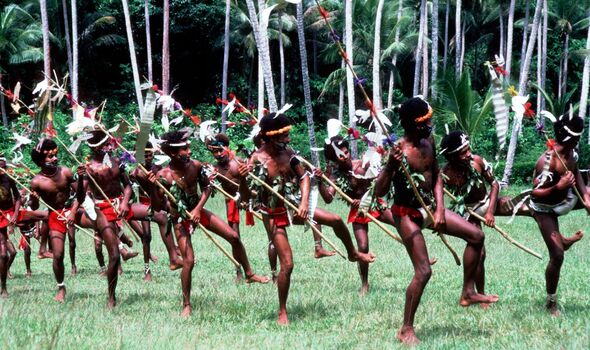
A violent tribal clash has left at least 30 people dead and 15 missing in Papua New Guinea’s remote Trobriand Islands, often referred to as the “islands of love.” The bloodshed erupted on Monday, resulting from a longstanding dispute between two villages that originated during a football match two months ago, linked to the country’s general election in July. The violence escalated when villagers from Kuboma destroyed yam gardens in the rival village of Kulumata, prompting a confrontation between the two communities.
Deputy opposition leader Douglas Tomuriesa, representing the Trobriand Islands, confirmed the death toll of 30. The clash escalated as villagers attacked a government office, leading to chaos that local authorities and church elders were unable to contain. Women and children fled the scene, leaving men from both villages engaged in the brutal confrontation.
Provincial Police Commander Peter Barkie reported that the initial dispute stemmed from rival football teams earlier this year on the sparsely policed island of Kiriwina. The situation escalated when villagers from Kulumata sought authorities’ intervention after their yam gardens were destroyed, triggering the deadly conflict.
The violence prompted the deployment of a police team from the capital, Port Moresby, to restore order and initiate the peace process. Internal Security Minister Peter Tsiamalili Jnr emphasized the police’s role in containing the situation and restoring order.
The mass killings in the “Islands of Love” were described as “truly horrific” by the Post-Courier, labeling it the highest death toll in the country’s ongoing tribal wars for the wholesale slaughter of innocent civilians. A local witness expressed the shock and fear of witnessing such violence on their island, highlighting the departure from the traditional cessation of fighting after a death.
Tribal fighting has deep roots in Papua New Guinea’s culture, but the continuation of hostilities without a customary ceasefire has intensified the impact on communities. The ongoing violence involved the use of various weapons, including short crowbars, stones, and metal bush knives.
Nelson Tauyuwada, a provincial government official, reported that the fighting had momentarily ceased as the two communities retreated to their respective areas to address the aftermath, potentially burying their dead.
Papua New Guinea, known for its cultural and linguistic diversity, has struggled with tribal violence and corruption since gaining independence in 1975. The recent clash adds to the challenges facing the nation, and despite efforts to stabilize the country, incidents like these underscore the deep-seated issues that persist.
RELATED ARTICLES
- US Pack of Savage 'Youths' Rip Grandmother's arm off, Brutally Killing her during Carjacking
- French Teacher Beheaded in BROAD DAYLIGHT over caricature of Prophet Mohammed
- Hellhole USA Episode 1: Here's what can happen to you if you walk the streets while being White
- Papua New Guinea “Universities” Expel White Academics Who Demanded “End to Cheating”
- Manus Island Chaos Looms as Invader Camp Closes











